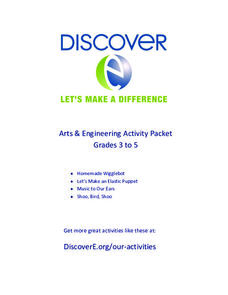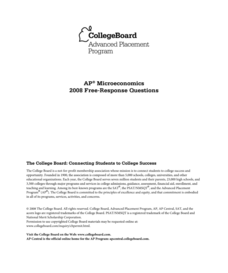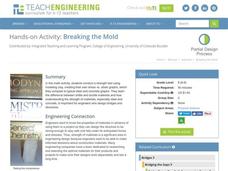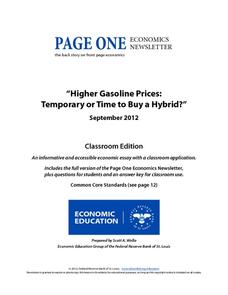Rice University
College Physics for AP® Courses
Take a look at an organized physics course. The 34-section electronic textbook covers material in AP® Physics 1 and 2. Teachers use the text to supplement lectures and have the class work through the labs. Each section contains...
Teach Engineering
Viscoelasticity
Stretch one's mind about viscoelastic materials. Future engineers learn about viscoelastic materials and how they differ from solids and fluids. They discover how the molecular structures of the materials relate to their properties,...
DiscoverE
Everyday Engineering: Tennis, Anyone?
Take a swing at a fun activity. Pupils first watch a video that introduces the concept of elasticity in association with tennis rackets. They then design their own rackets and build them out of available materials.
DiscoverE
Arts and Engineering Activity Packet: Grades 3-5
Art and science sometimes go hand in hand. A set of four activities for learners in grades 3-5 teaches engineering concepts as part of art projects. Class members build homemade robots, elastic puppets, musical instruments, and...
College Board
2008 AP® Microeconomics Free-Response Questions
The government can tweak the economy through a variety of tools. What are their long- and short-term effects? A problem set from College Board examines how the government sometimes pulls the strings to control the economy.
DiscoverE
Let's Make an Elastic Puppet
Create bending joints—but don't break! The activity shows how to make a puppet using straws and fishing line. Pupils create cuts to make joints that rely on the elasticity of the straw to bend and return to their original shapes.
DiscoverE
Creepy Putty
Mold your learners into materials engineers. Using glue, Borax, and water, scholars create a viscoelastic material. But your class might know it by another name—Silly Putty.
DiscoverE
Extreme Trampolines
You'll bounce off the walls with glee after finding a fun resource. Young engineers design trampolines for golf balls. They build and test out their design and make improvements based on the results.
CK-12 Foundation
Bow and Arrow
Where does the energy of an arrow come from? Is it from the person, the bow, or somewhere else? A simulation allows scholars to adjust the stretch distance and the elastic constant in order to understand where the energy comes from, what...
Teach Engineering
Spring Away!
The last segment of the nine-part unit makes a connection between springs and linear equations. Groups hang weights from the spring and measure its length. Then, using the data collected, they calculate the slope to find the k-value...
Teach Engineering
Energy and the Pogo Stick
Let your class bounce to examine the concept elastic potential energy. Individuals bounce on a pogo stick in order to calculate its elastic potential energy. Groups then compare the elastic potential energy to the gravitational...
Teach Engineering
Breaking the Mold
A little too much strain could cause a lot of stress. Groups conduct a strength test on clay. Using books as weights, pupils measure the compression of clay columns and calculate the associated strain and stress. Teams record their...
Teach Engineering
It's Tiggerific!
Spring into elastic potential energy with a lesson that provides background information on determining the elastic potential energy of springs and other elastic materials. General energy equations emphasize the conservation of...
Teach Engineering
Mechanics of Elastic Solids
Make the connection between Hooke's law and elasticity with an activity that introduces the class to the behavior of elastic materials. The resource defines stress and strain to calculate the modules of elasticity of...
Teach Engineering
Using Hooke's Law to Understand Materials
Provide a Hooke for a lesson on elasticity with an activity that has groups investigate a set of springs. They use a set procedure to collect data to calculate the spring constant for each spring using Hooke's Law. The groups...
It's About Time
Properties of Matter
Never trust an atom; they make up everything! Young chemists make modeling dough and add another ingredient to change the properties. Scholars then compare the properties of emulsion to composite materials. A reading passage and analysis...
Federal Reserve Bank
Higher Gasoline Prices: Temporary or Time to Buy a Hybrid?
Gasoline prices garner a lot of attention in the United States. What can explain a temporary decline in gasoline consumption, and how do gasoline prices spur innovation in the energy and automotive industries?
Curated OER
Silly Semi-Solids
Students create a polymer out of glue, water, and borax. They discuss the resulting substance and perform several experiments with it.
Curated OER
Freestanding Structures: A Tech Museum Floor Activity
Learners attempt to design the tallest structure that they can with the given materials which are wooden dowels and rubber bands. They discuss the physics of their structure and how they would improve it the next time they built a...
Curated OER
Chapter 20: Demand and Supply (Elasticities and Government-Set Prices)
Discussing first the elasticity of demand and then the element of supply, these slides present graphs and bullet points that would easily supplement your economics lecture. Viewers will appreciate the pacing of the slides, making it easy...
Mr. E. Science
Sound
Since light travels faster than sound, some people may appear bright until you hear them speak. The presentation covers what sound is, how fast it travels in various mediums, properties of sound, hearing, and the parts of the human...
Curated OER
To stretch or not to stretch
Hands-on is the best way to play. Learners read a graph that shows the force needed to stretch a rubber band. They do this and then participate in a simple experiment where they create coiled springs with wire. They work to determine how...
Curated OER
Bounce Back - The Long and Short of It
Upper elementary scientists test basketballs with differing amounts of air to find if inflation affects bounce height. The instructional activity introduction poses the question of whether or not the composition of a ball determines...
Curated OER
Elasticity and Collapse
Students discuss the oil crisis and a future world without oil. In this oil instructional activity, students watch videos online based on the reduced oil supply. They discuss how their regional community depends on oil and what would...

























